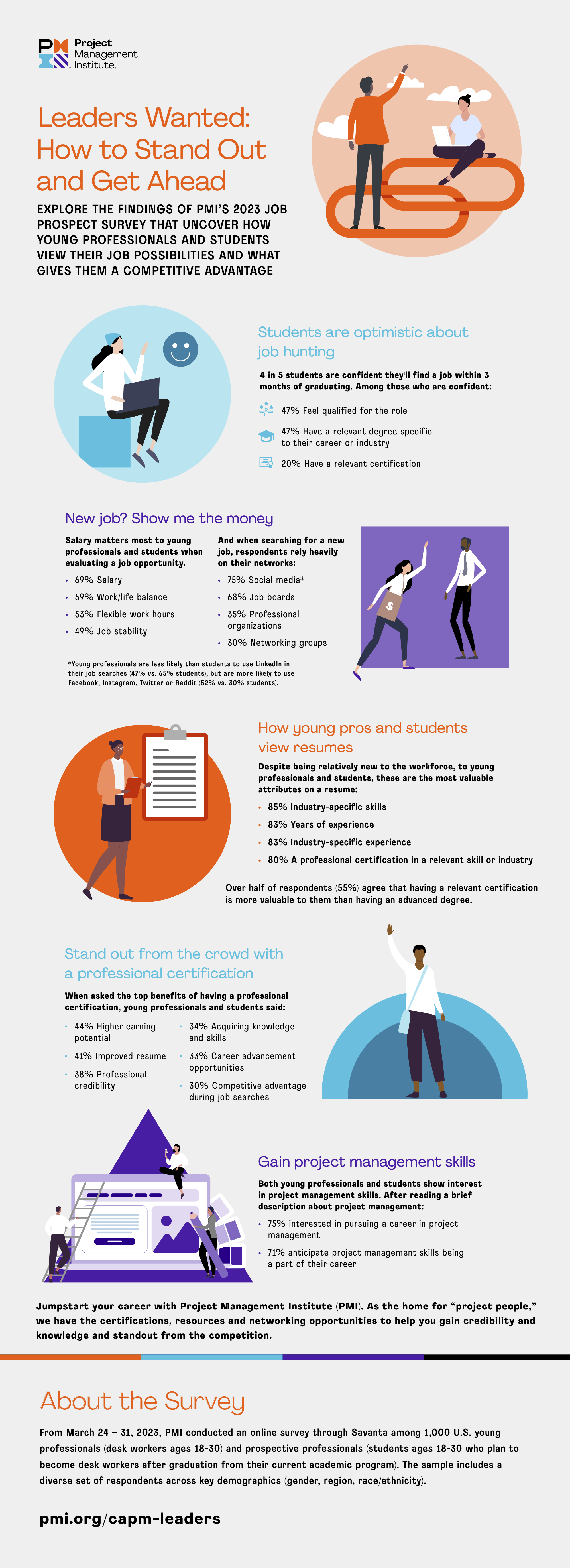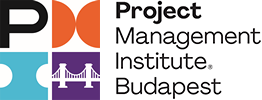June 14 2023 at 04:00AM
How Young Professionals Can Stand Out in Today’s Job Market
It’s graduation season, and new grads are turning their attention from last minute papers and final exams to the real work of finding a job.
And they’re pretty sure they’ll find one. Although only 6 percent of student respondents in a new PMI survey have a job lined up after graduation, 80 percent are confident they’ll find work within three months of graduating. A quarter of these students (26 percent) expect to graduate from their current academic program in less than a year.
Why are they so optimistic? Forty-seven percent point to both their qualifications and a relevant degree. But 20 percent are also confident because they have a relevant professional certification under their belt.
In fact, 55 percent of all survey respondents – which included 500 students (ages 18-30 who plan to become desk workers after graduation from their current academic program) and 500 U.S. young professionals (desk workers ages 18-30) – agree that having a relevant certification is more valuable than having an advanced degree. That number rises to 65 percent among young professionals alone.
When asked about the top benefits of having a professional certification, students cited:
- Higher earning potential (43 percent)
- An improved resume (43 percent)
- Professional credibility (39 percent)
- Acquiring knowledge and skills (38 percent)
- Competitive advantage during job searches (35 percent)
And when it comes to how these up-and-comers are finding their jobs, not surprisingly, most (76 percent) of all job searches by students are conducted via social media – LinkedIn, Facebook, Instagram and Twitter. Students are also very likely (65 percent) to draw upon school, university and/or alumni career resources. Other network-based approaches include professional organizations (36 percent) and networking groups (32 percent).
A Good Salary Tops the Wish List
What are students looking for in their first job? A good salary, for one thing. More than three-quarters (77 percent) of students prioritize salary when thinking about the top five most important attributes when evaluating job opportunities – even more than young professionals (61 percent). Students are also more likely than young professionals to value job stability in a new position (54 percent vs. 45 percent).
In the project management field, certifications can make all the difference in advancing in your career to earn more money. PMI data shows that established Certified Associate in Project Management (CAPM)® certification holders are now in a more senior role than when they first earned the certification, and one can assume this move came with an increased salary. In PMI’s most recent Salary Survey, respondents with a Project Management Professional (PMP)® certification reported higher median salaries than those without a PMP certification – 16 percent higher on average across the 40 countries surveyed.
But are students and young professionals prioritizing certifications? Interestingly, but perhaps not surprisingly, young professionals are more likely than students to have a professional certification (32 percent vs. 18 percent). But students are more likely to be both pursuing a certification (23 percent vs. 7 percent) and planning to pursue one within the next five years (29 percent vs. 20 percent).
However, most young professionals (61 percent) don’t have a certification and are not planning to get one. The primary reason? Cost. Thirty-six percent of young professionals say certifications are too expensive, while others find them too time consuming (29 percent) or are unaware of certifications relevant to their career (22 percent).
One way to encourage young professionals to pursue a certification would be to make them more accessible, especially through employer reimbursement. Seventy-six percent of young professionals say they would be more likely to pursue certification if their employer offered reimbursement.
Social media is clearly influential for young professionals, as 41 percent of those holding or pursuing a professional certification learned about them through social channels. Certification holders should share their authentic experiences of obtaining their credentials on social media to help guide the next generation of professionals. Similarly, professional organizations offering certifications to young professionals should not only share their product information but also engage in meaningful conversations on social channels to grow their professions.
Burnout Prevalent Among Young Professionals
Many young professionals could use such a boost. Fifty-one percent report feeling burned out on the job. This is consistent with findings from PMI’s 2023 Workplace Engagement Survey, which found that young professionals are more likely than other desk workers to feel negative emotions at work.
Nevertheless, most young professionals (66 percent) in our Job Prospect Survey plan to stay at their current job for at least a year. And seven in ten (70 percent) say their current job aligns with their values and provides opportunities for professional development (69 percent).
Employers, however, shouldn’t become complacent. Many young professionals say they feel they need to change jobs to reach certain milestones, including:
- Expand their network (66 percent)
- Learn new skills (65 percent)
- Receive a raise (64 percent)
- Receive a promotion (62 percent)
Employers should consider conducting regular employee surveys to monitor engagement levels and potential issues among young employees. Creating a work environment that emphasizes structure, clarity, purpose and psychological safety can go a long way in countering feelings of burnout.
Project Management Skills are Top-of-Mind
Altogether, 72 percent of total respondents are familiar with the project management field. Not surprisingly, young professionals are more likely than students to be familiar with the field (80 percent vs. 63 percent) and to be interested in pursuing a project management career (80 percent vs. 71 percent).
That’s because interest in pursuing a career in project management increases with familiarity (85 percent among those familiar vs. 44 percent among those not familiar). Still, 71 percent of all respondents anticipate project management skills being part of their career.
Indeed, 85 percent of all respondents agree that industry-specific skills are valuable attributes to have on a resume, along with years of experience (83 percent), industry-specific experience (83 percent), and professional certification (80 percent).
Steps to Take as a New Grad
For new graduates or those wishing to explore options in the project management field, KICKOFF™ is a great starting point. It’s free and teaches the basics of project management in less than an hour. You can also tailor your learnings with modules devoted to both predictive (waterfall) and agile methodologies.
For those interested in project management as a career or learning these in-demand skills, PMI offers several certifications that would pave the way. The CAPM certification, for example, covers the fundamentals of project management, including project scoping, scheduling, cost estimating, communication, and stakeholder management. It’s a great first step in building a career in project management and lays the groundwork for more advanced certifications.
Whether you’re a student or a young professional, you should also consider PMI’s Career Navigator, a terrific tool that can help you develop a personalized action plan for your career journey. It involves a rigorous self-assessment, support in developing an action plan, and suggestions for advancing your career day-by-day, week-by-week.




